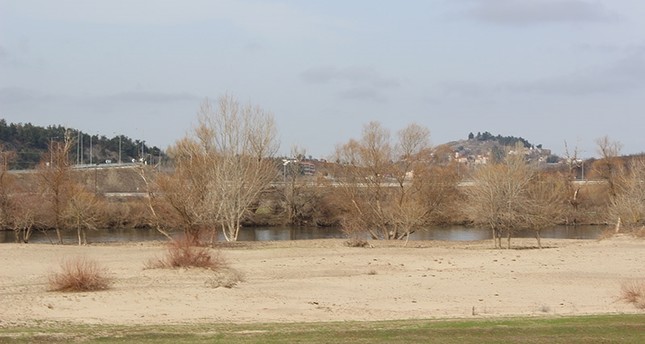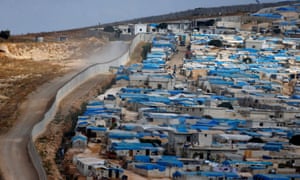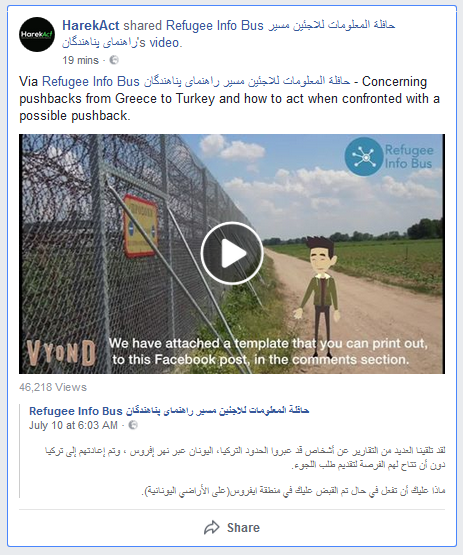Via Daily Sabah

The bodies of three people thought to be irregular migrants have been found in separate border villages in Turkey’s northwestern Edirne province, security sources said Tuesday.
Via Daily Sabah

The bodies of three people thought to be irregular migrants have been found in separate border villages in Turkey’s northwestern Edirne province, security sources said Tuesday.
The Greek group ‘Racist Crime Watch‘ published new evidence of police violence and illegal push-backs of asylum seekers from Greece to Turkey via the Evros river. In a letter to the Commissional for Human Rights of the Council of Europe, Dunja Mijatović, they address these mistreatments:
Another video evidence of police violence and illegal deportation of asylum seekers in Evros
Dear Commissioner,
Further to our 9 and 29 September 2018 letters, we are sending another update with information published in Hurriyet Daily News and reprinted (without editing) here.
Via Hurriyet Daily News (13th November) – Turkish villagers warmly welcome migrants after Greek police beat them naked

Residents of the Kiremitçi Salih village in the northwestern Turkish province of Edirne warmly welcomed a group of migrants they found naked and exhausted in their fields late Nov. 11.
Continue reading New evidence of police violence and illegal deportation of asylum seekers in Evros
Via The Guardian [16.10.2018] – With tension mounting in Idlib, people trying to flee across the border are being given the choice of detention or waiving their right to asylum

Tareq* can recall in detail each of the 22 times he climbed over the concrete border wall, dodged a flurry of bullets, and sprinted as fast as he could – until Turkish border guards caught him and turned him back.
*Names have been changed to protect identities
Via IRIN
Linda, a 19-year-old Syrian and registered refugee, had just crossed from Turkey into Greece at the Evros River when men carrying guns appeared, seemingly out of nowhere. She wasn’t sure if they were police officers or soldiers, but they emerged from behind trees and wore dark uniforms that helped them blend into the night.
This article was originally published by IRIN
Via Daily Sabah (20th July) – Forty-four illegal immigrants who were apprehended by Turkish troops near the border, claimed they were beaten by Bulgarian police and sent back to Turkey, the İhlas News Agency reported. Migrants from Afghanistan, Pakistan, Iraq and Iran were discovered by gendarme troops guarding the border between Turkey and Bulgaria in the Kofçaz district of the Turkish province of Kırklareli on Friday. They told Turkish officials that they crossed into Bulgaria three days ago but were captured by Bulgarian police. They claimed Bulgarian police officers beat them and stole their money and valuable possessions before sending them back to the Turkish side of the border. Continue reading Migrants claim abuse by Bulgarian police
The HarekAct editorial board attended the 16th kritnet conference in Göttingen between 11-13th of May. It was a very good occasion to share and exchange knowledge, meet our friends, activists and colleagues again and discuss future projects and plans. We took part in the workshop titled “Post 2015 Border Regime – Re-Stabilization of the European Border Regime after the ‘Long Summer of Migration’”. We discussed the extension of borders into the cities following the example of Istanbul; the state of the border regime and public debate on migration in Turkey; and the impact and future of the EU-Turkey statement for both Greece and Turkey. Besides the individual inputs, we had a rich collective discussion with various perspectives, information and experiences brought by activists, researchers and professionals from Germany, Turkey, Greece and Kurdish region, and we are looking forward to keep building on the ideas we had as well as the connections we built there.
Although with a little bit of delay, now we would like to share our contributions to the workshop one by one. Enjoy the inputs presented by HarekAct editors in written and updated form in our blog. Keep posted!

by Lisa Groß
Disobedient Border Crossings…
Since the EU-Turkey Deal, the number of clandestine border crossings has dropped substantially, and the agreement is still deterring many migrants from crossing the Aegean Sea. But that’s not the whole picture: Since April 2016, more than 60.000 people made it across the Aegean, and boats are still landing on the islands on an almost daily basis, despite augmented border control. Recently, the number of migrants arriving on the Greek Aegean islands via the sea are increasing again. While around 3.200 people arrived between April and May 2017, the number almost doubled during the same period in 2018, with circa 6.000 migrants making it safely to Greece. This year up until mid-June, circa 13.000 migrants have crossed from Turkey to Greece, with most of the boats still arriving on Lesvos island (ca. 7.000) (see UNHCR).
In the following text, I will take a closer look at the changes and dynamics in the Aegean Sea following the EU-Turkey Deal. Although border patrol agents are increasing their capacities, we are still witnessing many disobedient border crossings and a civil society which continues to report about rights violations at sea. Continue reading Shedding Light on the Maritime Border between Turkey and Greece – Changes in the Border regime in the Aegean Sea since the EU-Turkey Deal
Refugee Info Bus حافلة المعلومات للاجئين مسیر راهنمای پناهندگان recently published a video concerning pushbacks from Greece to Turkey and how to act when confronted with a possible pushback.
Watch the video here.

Via AlJazeera – Greek police detained 1,658 refugees and migrants in March after they crossed the border from Turkey by land.
A growing number of refugees and migrants are reaching Greece via land routes from Turkey, with Greek authorities increasingly accused of carrying out illegal pushbacks on the land borders.
On Friday, the Greek police said that 1,658 refugees and migrants were detained in March after crossing into Greece through the Evros River, which is situated on the Turkish border. Continue reading Refugees increasingly entering Greece via land routes
** German version below / Deutsche Version weiter unten **
This newsletter has been published as part of the bordermonitoring.eu newsletter, which is – for now – available in German only.
Two years after the signing of the EU-Turkey Deal, only one part of the monetary obligation has been fulfilled by the European side so far: The payment of 3 billion Euro to several agencies in Turkey. The main part of the agreement has not been fulfilled by the EU though, a fact that is being hardly discussed in Turkish media: visa-free travel to Europe for Turkish citizens and renewed EU accession talks.
Meanwhile, Turkish authorities keep proving that they are fulfilling their part of the legally questionable deal by arresting undocumented migrants in different border regions. In early March, Turkish authorities declared that they apprehended a total of 5.371 migrants just within one week. According another source, Turkish security forces stopped 50.000 people in 2017 at the land border with Bulgaria and Greece. Meanwhile, Doctors Without Borders (MSF) criticizes violent push-backs to Turkey conducted by Bulgarian authorities and Human Rights Watch scandalizes on-going illegal push-backs carried out by Turkish border guards on the border zone with Syria.
Regarding the situation on the Greek side, Refugee Support Aegean (RSA), an initiative supported by Pro Asyl, claims that the very poor reception conditions on the Greek islands are part of the deterrence policy against potential migrants coming from Turkey. Overcrowding, lack of infrastructure and gender-based violence against vulnerable individuals are some of the main problems in the hot spots. However, despite horrible conditions of reception and ongoing deportations from the Greek islands to Turkey, migrants continue to make the journey to the Greek islands daily crossing the sea in unseaworthy boats. Too often these journeys end deadly, as on March 17th when 16 people including at least 5 children drowned after their boat capsized. In this context, family members of the dead and missing are accusing the Greek authorities: Despite several calls for help by a relative, the authorities did not start a search and rescue operation for too long, thereby approvingly accepting their death.
By now, it is also Turkish citizens – mainly dismissed civil servants – who take the boats to Greece. According to Greek authorities, 1.800 Turkish nationals applied for asylum in Greece in 2017.
In the Greek hot spots, where thousands of migrants are trapped in overcrowded camps and terrible conditions, most of the children have no access to formal education. The situation of refugee children is similarly problematical in Turkey. Apart from limited access to education, the legal status of the Syrian babies born in Turkey is uncertain. According to a report published by the Turkish Parliament’s Refugee Subcommittee, there are 311.000 babies of Syrian origin, born in Turkey but deprived of both Turkish and Syrian citizenship. Nevertheless, state news agency Anadolu announced that the International Pediatric Association (IPA) would give its International Peace Award to president Erdoğan for his contributions to the lives of refugee children.
Apparently, the Turkish governments plans to deport a part of the Syrian refugees living in Turkey back to Syria. Already shortly after the start of Turkish military operation in Afrin, president Erdoğan said – while speaking to provincial leaders at his presidential palace – that “We are not in a position to continue hosting 3.5 million refugees forever. We’ll solve the situation in Afrin […] and we would like our refugee brothers and sisters to return to their own country”. Some journalists argue that this discourse is related to the increasing discontent among Turks towards Syrian refugees living in Turkey. Since the beginning of the Afrin offensive, resentments against Syrians in Turkey have been growing further. Considering this, it is not surprising that in early March Turkish authorities announced their will to set up camps for 170.000 displaced people in nine different regions within Syria, a country that is still in the middle of a war.
ZWEI JAHRE EU-TÜRKEI-DEAL
Zwei Jahre nach Unterzeichnung des EU-Türkei-Abkommens wurde von europäischer Seite bisher nur ein Teil der finanziellen Verpflichtungen erfüllt: die Zahlung von drei Milliar Euro an verschiedene Träger in der Türkei. Ein Großteil der Abmachungen wurde seitens der EU jedoch nicht eingehalten – worüber in den türkischen Medien seltsamerweise kaum berichtet wird: die visafreie Einreise für türkische Staatsangehörige in die EU sowie die Fortführung und Vertiefung der Beitrittsgespräche.
Unterdessen beweisen die türkischen Behörden jedoch weiterhin, dass sie ihren Teil des flüchtlingsrechtlich fragwürdigen Abkommens erfüllen, indem sie Geflüchtete in verschiedenen Grenzregionen festnehmen. Anfang März gaben türkische Behörden an, innerhalb von nur einer Woche 5.371 Migrant_innen aufgegriffen zu haben. Laut einer anderen Quelle stoppten türkische Sicherheitskräfte im Jahr 2017 an der Landgrenze zu Bulgarien und Griechenland insgesamt 50.000 Menschen. Ärzte ohne Grenzen kritisiert gewaltsame Push-Backs in die Türkei, die von bulgarischen Grenzbeamt_innen durchgeführt werden, während die Menschenrechtsorganisation Human Rights Watch von anhaltenden illegalen Push-Backs durch türkische Grenzbeamt_innen an der Grenze zu Syrien berichtet.
Hinsichtlich der Situation auf griechischer Seite betont die von Pro Asyl unterstütze Initiative Refugee Support Aegean, dass die sehr schlechten Aufnahmebedingungen auf den griechischen Inseln Teil der europäischen Abschreckungspolitik gegenüber potentiellen irregulären Migrant_innen aus der Türkei sind. Überfüllung, unzulängliche Infrastruktur und geschlechtsspezifische Gewalt sind nur einige der Probleme in den Hotspots. Trotz der schrecklichen Aufnahmebedingungen und der anhaltenden Abschiebungen von den griechischen Inseln zurück in die Türkei versuchen weiterhin täglich Migrant_innen, in kaum seetauglichen Booten auf die griechischen Inseln zu gelangen. Nach wie vor enden viele dieser Reisen tödlich, so wie am 17. März, als 16 Menschen, darunter mindestens 5 Kinder, ertranken, nachdem ihr Boot gekentert war. Gegen die griechischen Behörden werden in diesem Zusammenhang seitens der Angehörigen massive Vorwürfe erhoben: Sie sollen den Betroffenen trotz vieler Hilferufe durch einen Verwandten nicht zur Hilfe geeilt sein und damit ihren Tod billigend in Kauf genommen haben.
Inzwischen beantragen auch immer mehr türkische Staatsbürger_innen – vor allem entlassene Beamt_innen –, Asyl in Griechenland. Nach Angaben griechischer Behörden stellten 2017 insgesamt 1.800 türkische Staatsangehörige einen Asylantrag.
DIE SITUATION GEFLÜCHTETER KINDER
In den griechischen Hotspots, wo Tausende Menschen in überfüllten Camps und unter schrecklichen Bedingungen ausharren müssen, haben die meisten Kinder keinen Zugang zu Bildung. Ähnlich problematisch ist die Situation geflüchteter Kinder in der Türkei. Abgesehen von dem begrenzten Zugang zu Bildung ist der rechtliche Status von in der Türkei geborenen syrischen Kindern oftmals ungeklärt. Laut einem Bericht des Flüchtlingsausschusses des türkischen Parlaments leben in der Türkei 311.000 Kinder syrischer Eltern, die in der Türkei geboren wurden, aber weder die türkische noch die syrische Staatsbürgerschaft erhalten. Dessen ungeachtet gab die staatliche Nachrichtenagentur Anadolu bekannt, dass die International Pediatric Association Präsident Erdoğan den Internationalen Friedenspreis für sein Engagement für Flüchtlingskinder verleihen werde.
DIE AFRIN-OPERATION UND DIE FLÜCHTLINGSLAGER IN SYRIEN
Offenbar plant die türkische Regierung, einen Teil der syrischen Geflüchteten im Land nach Syrien abzuschieben. Bereits kurz nach Beginn der türkischen Militäroperation in Afrin erklärte Präsident Erdoğan im Zuge von Gesprächen mit Lokalpolitiker_innen: „Wir sind nicht in der Lage, 3,5 Millionen Flüchtlinge für immer zu beherbergen. Wir werden die Situation in Afrin regeln […] und wir möchten, dass unsere geflüchteten Brüder und Schwestern in ihr eigenes Land zurückkehren.“ Einige Journalist_innen sind der Ansicht, dass derartige Aussagen in Zusammenhang mit der zunehmenden Unzufriedenheit in Teilen der türkischen Bevölkerung hinsichtlich der im Land lebenden syrischen Geflüchteten zu sehen sind. Seit Beginn der Afrin-Offensive sind die Ressentiments gegenüber Syrer_innen sogar noch weiter angewachsen. Und so verwundert es auch nicht, dass türkische Behörden Anfang März verkündet haben, Flüchtlingslager für insgesamt 170.000 Vertriebene in neun verschiedenen Regionen Syriens errichten zu wollen – in einem Land, das sich nach wie vor im Krieg befindet
Das ist ein wenig verwirrend. Die 3 Milliarden wurden ja schon vor zwei Jahren zugesichert. Und jetzt nochmal? Das macht ja wenig Sinn. Wurde das Geld schon ausgezahlt oder haben sie jetzt nur nochmals zugesichert, dass sie es auch wirklich bezahlen werden? Und die 3 Milliarden sind ja auch nur die erste Tranche von insgesamt 6 Milliarden, richtig? Das wird in dem Absatz alles nicht so richtig klar…Und für was wurde das Geld überwiesen?